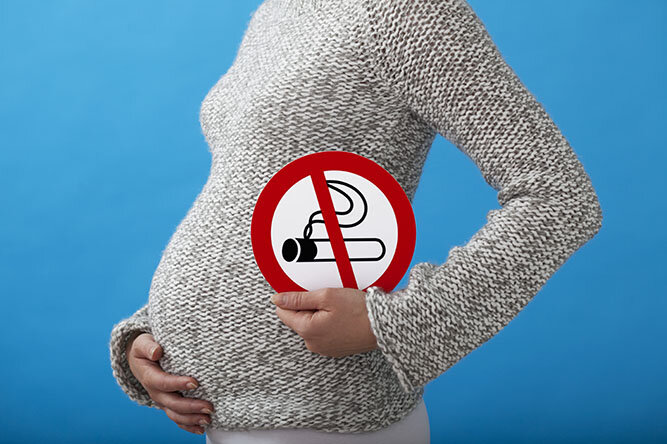Smoking During Pregnancy

Boy? Girl? Regular or menthol? Despite the risks of smoking, one in fourteen women said that they smoked while they were pregnant. Smoking can cause significant risks, not only with mom but also with baby.
During the first few days after conception, the fetus is developing rapidly and is highly susceptible to cigarette smoke’s genetic damage. Each cigarette contains 4,000 chemicals. Those chemicals, which include nicotine, are then passed through the mother’s lungs, flowing to the placenta. Nicotine narrows the blood vessels, thus reducing blood flow to the baby. This restriction of blood flows means a reduction in oxygen and nutrients to the baby, which increases the chances of having a miscarriage.
Some of the risks for the unborn baby because of smoking include:
- Tissue damage, especially with the development of the baby’s lungs and brain, which can last through the child’s teen years
- Several studies have shown a correlation between smoking and a baby born with a cleft lip
- Low birth rate
- An increased risk of dying from SIDS (Sudden Infant Death Syndrome)
- Weaker lungs
Electronic cigarettes, commonly known as e-cigs or vape pens, have emerged as an alternative to cigarette smoking. Most e-cigarettes, however, still contain nicotine, which is addictive and toxic to developing fetuses. E-cigarettes are considered unsafe for youth, young adults, pregnant women, and adults who do not use tobacco products.
Secondhand smoke is just as dangerous, and both can cause placental abruption. Placental abruption occurs when the placenta partly or completely separates from the uterus’s inner wall before delivery. This can decrease or block the baby's supply of oxygen and nutrients and cause heavy bleeding in the mother.
Placental abruption can cause life-threatening problems for both mother and baby.
For the mother, placental abruption can lead to:
- Shock due to blood loss
- Blood clotting problems
- The need for a blood transfusion
- Failure of the kidneys or other organs resulting from blood loss
- Rarely, the need for a hysterectomy if the uterine bleeding can't be controlled
For the baby, placental abruption can lead to:
- Restricted growth from not getting enough nutrients
- Not getting enough oxygen for the baby
- Premature birth
- Stillbirth
Getting help to quit smoking
It’s never too late to ask for help to quit smoking. The earlier that you decide to quit smoking, the better off you and baby will be.
Some forms of help include:
- Apps - Several apps can be downloaded on your mobile device to send daily tips and words of encouragement to help you get through this addictive habit.
- NRT products - NRT stands for Nicotine Replacement Therapy. Different types of NRT include:
- Transdermal patch
- Chewing gum
- Nasal Spray
- Oral inhaler
- Tablets
Although smoking is on the decline in the United States, there is still more work to continue decreasing that percentage. When you smoke, your baby smokes. If you are pregnant and currently smoking, talk to your physician about your options to quit smoking.


